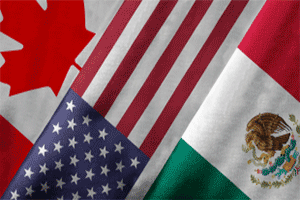Trade Promotion Authority
Reauthorization Needed to Expand Markets for U.S. Exporters in Times of Global Economic Uncertainty
• Trade Promotion Authority allows the United States to compete with other countries that are negotiating agreements with each other.
• Trade Promotion Authority ensures that the United States may continue to gain access to world markets, resulting in an improved economy and additional employment of Americans.
Background
Trade promotion authority (formerly called fast track trade negotiating authority) is the process by which Congress gives authority to the President and/or U.S. Trade Representative to enter trade negotiations to lower U.S. export barriers. Traditionally, trade promotion authority follows the conclusion of negotiations for a trade agreement; enabling legislation is submitted to Congress for approval.
Once legislation is submitted, under trade promotion authority, both houses of Congress will vote “yes” or “no” on the agreement with no amendments and do so within 90 session days (not to be confused with a treaty, which is “ratified” by the U.S. Senate). During negotiations, however, there is a process for sufficient consultation with Congress.
President George W. Bush signed the landmark Trade Act, H.R. 3009, on August 6, 2002. This renamed the previous “fast track authority” granted via the Trade Act of 1974. The act helped put U.S. businesses, workers and consumers back in the game of international trade by granting the president trade promotion authority.
At the request of President Donald J. Trump, trade promotion authority was renewed in July 2018 for three years. Congress was tasked with reauthorizing trade promotion authority in 2021; unfortunately, the Biden administration did not request renewal of trade promotion authority, and it expired on July 1, 2021.
After the expiration, a few U.S. House Republicans called on President Joe Biden to end his trade moratorium and begin consulting with Congress to renew the authority. The last time trade promotion authority expired, in 2007, it took Congress eight years to renew it. It is hoped that with the new Republican majority, a trade promotion authority bill might be possible in 2025.
Impact: U.S. Completed Agreements
Since the Trade Act of 2002 granted the President trade promotion authority, the United States has completed the following free trade agreements: U.S.-Australia; U.S.-Bahrain; U.S.-Chile; U.S.-Colombia; U.S.-Dominican Republic/ Central American; U.S.-Israel; U.S.-Jordan; U.S.-Mexico-Canada Agreement; U.S.-Morocco; U.S.-Oman; U.S.-Panama; U.S.-Peru; U.S.-Singapore; and U.S.-South Korea.
Financially, these free trade agreements translate into the removal of billions of dollars in tariffs and nontariff barriers for U.S. exports.
Future Agreements
Major U.S. trading partners are participating in numerous agreements, and trade promotion authority is a prerequisite to meaningful U.S. participation.
Without trade promotion authority, the United States has been compelled to sit on the sidelines while other countries negotiate numerous preferential trade agreements that put U.S. companies at a competitive disadvantage. Trade promotion authority not only opens markets and broadens opportunities for U.S. goods and firms; it keeps the United States a leader in global trade.
By reauthorizing trade promotion authority, Congress can help strategically address any range of U.S. trade negotiations which might be pursued under the Trump administration.
The United States is among the world’s leading exporters due to increased market access achieved through trade agreements. Trade promotion authority is vital for the President of the United States to negotiate new multilateral, bilateral and sectoral agreements that will continue to tear down barriers to trade and investment, expand markets for U.S. farmers and businesses, and create higher-skilled, higher-paying jobs for U.S. workers.
Anticipated Action
It is hoped that the trade promotion authority might be reauthorized in 2025, and Congress will once again take up a trade-focused agenda.
Historically, renewal of trade promotion authority has been tied to other trade-related legislation such as the Trade Adjustment Assistance program, which provides job training assistance to workers who were displaced as a result of trade.
CalChamber Position
The California Chamber of Commerce, in keeping with longstanding policy, enthusiastically supports free trade worldwide, expansion of international trade and investment, fair and equitable market access for California products abroad and elimination of disincentives that impede the international competitiveness of California business.
The CalChamber, therefore, supports the extension of trade promotion authority so that the President of the United States may negotiate new multilateral, sectoral and regional trade agreements, ensuring that the United States may continue to gain access to world markets, resulting in an improved economy and additional employment of Americans.
February 2025
Agriculture and Resources
California Environmental Quality Act (CEQA)
Climate Change
Education
Energy
Environmental Regulation
Health Care
Housing and Land Use
Immigration Reform
International Trade
Labor and Employment
Legal Reform
Managing Employees
Privacy
Product Regulation
Taxation/Budget
Tourism
Transportation
Unemployment Insurance/Insurance
Water
Workers’ Compensation
Workplace Safety
Recent News
International Bills
- Federal Bills
- 2025-2026 Bills
- 2023-2024 Bills
- 2021-2022 Bills
- 2019-2020 Bills
- 2017-2018 Bills
- 2015-2016 Bills
Councils
Coalitions
- Alliance for Fair Trade with India
- California Coalition for Free Trade
- Federation of International Trade Associations
- North American Rebound
- Trade Works for US
- U.S. Council for International Business (USCIB)
- USA * Engage
Policy Contact
 Susanne Stirling
Susanne Stirling
Senior Vice President, International Affairs






